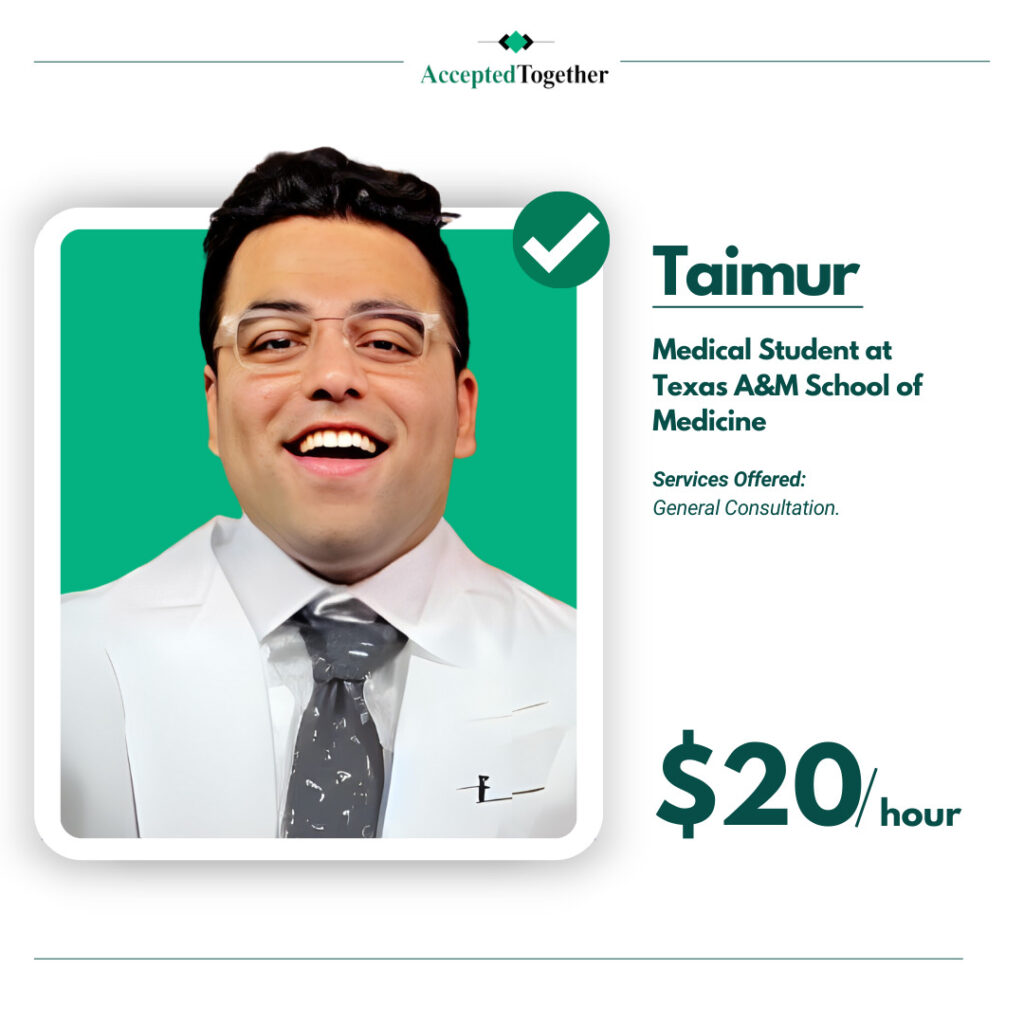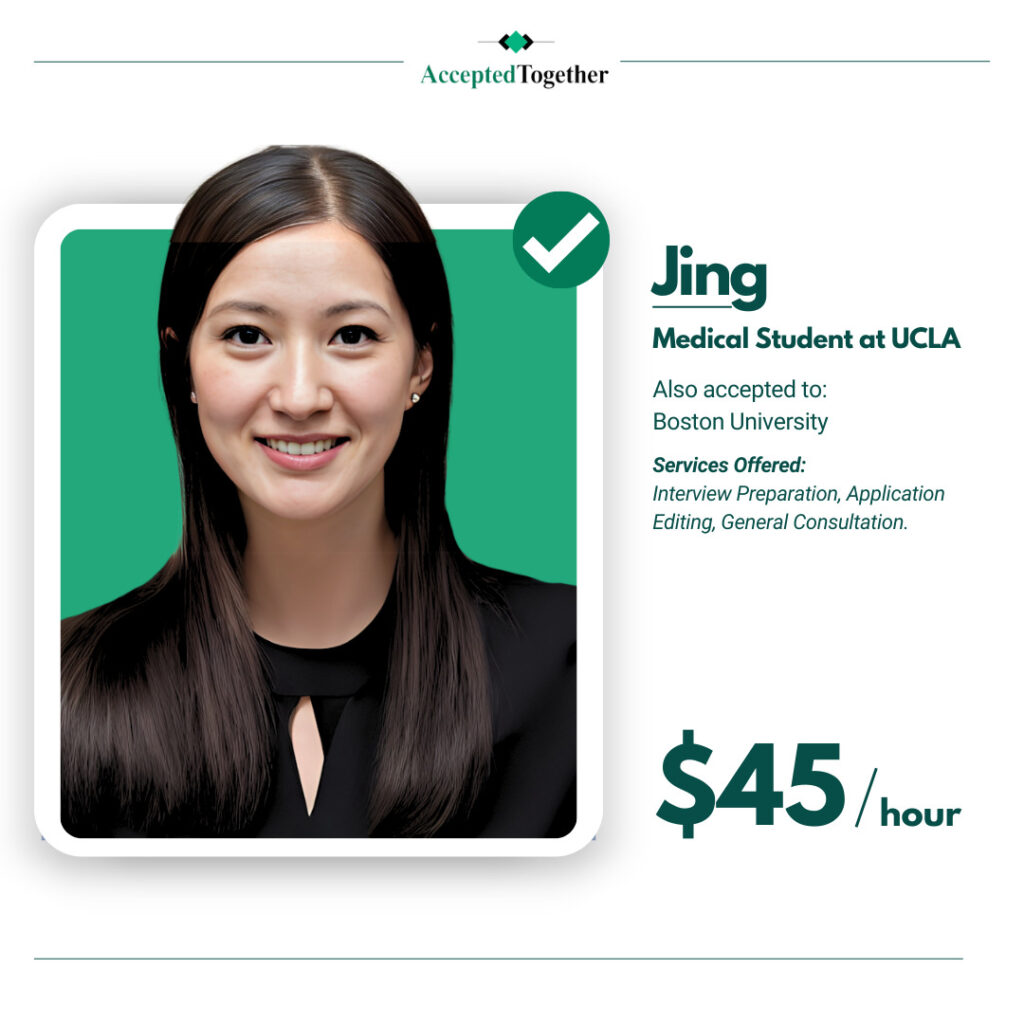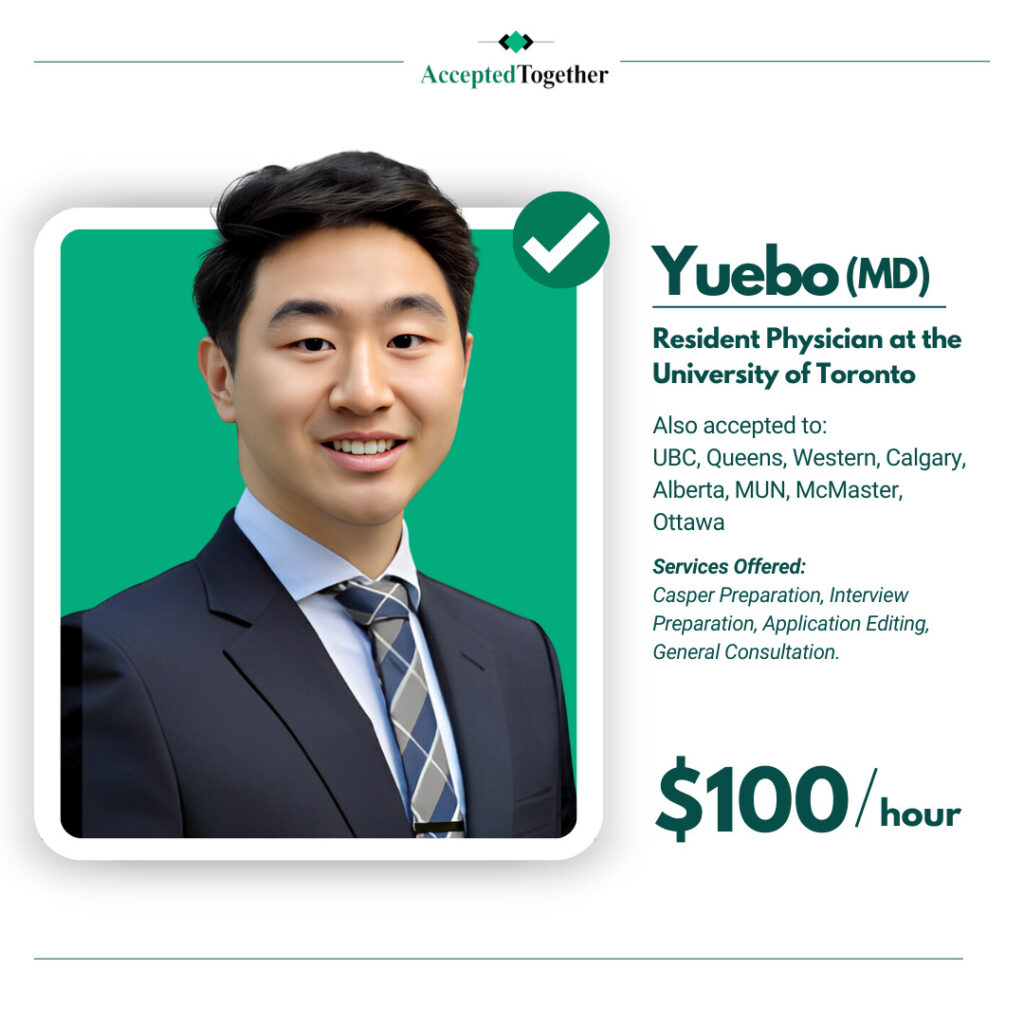
Table of Contents
INTRODUCTION
Navigating the labyrinth of medical school applications is no easy task. As you juggle GPAs, MCAT scores, and primary applications, you may find yourself confronting an often underestimated but crucial component of the process: the secondary essay. While the primary application showcases your academic prowess and general experience, the secondary essay delves deeper, offering medical schools a window into your unique journey, values, and compatibility with their program.
This important tool in your medical school application arsenal requires careful handling. Crafting a compelling secondary essay for some medical schools involves more than a demonstration of your academic accomplishments; it’s an artful balance of personal narrative, future aspirations, and a dash of persuasion. This is your opportunity to let admissions committees know why you are not just another aspiring medical professional, but a future physician with a distinct voice and a dream that aligns seamlessly with their mission.
Whether you’re discussing a personal challenge, portraying your cultural competency, or illustrating your fit with a particular school, each word you inscribe adds color to your application, transforming you from a list of grades and scores to a vibrant, three-dimensional candidate. With strategic planning, thoughtful reflection, and a little creativity, the secondary essay can become your secret weapon in getting the acceptance letter.
Understanding the Purpose of Secondary Essays
In the demanding journey to medical school, the secondary essay often gets overshadowed by other application components. However, understanding its purpose and the pivotal role it plays in admissions is key to crafting an application that resonates with the admission committee.
The Specific Role of Secondary Essays in Medical School Applications
The primary function of secondary essays in medical school applications is to showcase your unique character and motivations that extend beyond academic achievements. While your GPA and MCAT score demonstrate your intellectual aptitude, the secondary essay allows the admissions team to connect with you on a personal level. These essays are an opportunity to spotlight your journey, your obstacles, and the lessons learned along the way. They also serve to highlight your understanding of the medical profession and your commitment to the school’s specific mission.
Crafting a powerful secondary essay is more than just answering a question; it’s about constructing a narrative that underlines your dedication, resilience, and suitability for the medical profession. From discussing a significant challenge to showcasing your cultural competency, these essays offer a platform to prove your readiness for the rigors of medical school and your potential contribution to the field.
How Secondary Essays Differ From Primary Applications
The key difference between primary applications and secondary essays lies in their focus. While primary applications broadly outline your qualifications and experiences, secondary essays dive deeper into the particulars. They aim to unveil the person behind the test scores and grades, giving insight into your character, values, and aspirations.
In contrast to the more general questions in primary applications, secondary essays tend to be school-specific, asking you to connect your goals and experiences with the mission and values of the institution. These prompts can range from exploring your understanding of a school’s specific approach to healthcare, such as community-focused care, to your plans of utilizing their unique resources or programs.
Through your secondary essay, you have the chance to demonstrate why you are a fit for medical school in general and why you are a perfect match for their particular program. To do this effectively,you must have a well-researched understanding of the school’s ethos, curriculum, and community initiatives.
Frequently Asked Questions About Secondary Essays
There are a number of frequently asked questions about secondary essays. One of the most common is about timing. While there isn’t a hard and fast rule, it’s recommended to submit your secondary essays within two weeks of receiving them. This shows your keen interest and commitment to the school.
Another common query relates to the number of essays required. The number can vary from one school to another, with some schools requiring just one or two essays while others might require up to ten. It’s advisable to check the specific requirements of your chosen schools well in advance.
Another popular question is about what happens if you miss the deadline. This could significantly impact your application, as it may be interpreted as a lack of dedication. Most schools prefer to see a commitment to their institution, which is demonstrated by submitting your secondary essays promptly and of high quality.
Understanding the purpose and significance of secondary essays in your medical school application is the first step towards crafting a narrative that paints a comprehensive picture of your candidacy, revealing not just a future doctor, but a future leader and innovator in the healthcare field.
Identifying Common Themes in Secondary Essay Prompts
In the intricate labyrinth of medical school applications, decoding secondary essay prompts may seem like a challenge. By identifying recurring themes in these prompts, you can strategically prepare your responses to effectively articulate your suitability for a medical career.
The “Why our school?” Question
The “Why our school?” query is one of the most common themes in secondary essay prompts. This question provides the admissions committee with insight into how you resonate with their school’s mission, values, and program specifics. It’s crucial that your response reflects a genuine understanding and alignment with their ethos.
Your answer should reveal a well-researched understanding of the school’s unique features, whether it be their cutting-edge research opportunities, community-focused healthcare programs, or distinctive curriculum. Your goal is to clearly express why you’re a perfect fit for their school and how their resources align with your career aspirations. A tailored response emphasizing your alignment with the institution’s mission is more likely to impress than a generic statement.
Cultural Competency and Its Relevance
Cultural competency is another common theme within secondary essay prompts. Given the global nature of healthcare and the increasing diversity of patient populations, demonstrating your ability to navigate different cultures, beliefs, and lifestyles is vital.
When addressing cultural competency in your secondary essay, consider examples from your personal or professional life where you’ve dealt with diverse groups or managed cultural barriers. Discuss your learnings from these experiences and how they have prepared you to be a more compassionate and effective healthcare provider.
Addressing “Overcoming Challenges”
The theme of “overcoming challenges” is frequently included in secondary essay prompts. Admissions committees are interested in understanding how you react in the face of adversity, as it’s a reflection of your resilience, a trait essential for a demanding career in medicine.
Addressing this theme, focus on a situation where you faced significant adversity, how you approached it, and most importantly, what you learned from it. The emphasis should be on growth and resilience rather than the hardship itself. This gives the admissions committee an insight into your problem-solving abilities and your potential to deal with the rigorous demands of medical school and beyond.
Discussing “Future Goals”
Another recurring theme in secondary essays is “future goals”. Here, you’re expected to describe your career ambitions clearly and how the specific medical school can help you achieve them.
While discussing future goals, remember to strike a balance between being specific and being flexible. For instance, while you may have a strong interest in oncology now, it’s important to acknowledge the diverse range of experiences that medical school can offer, and that your interest could evolve. Always link your future goals to the specific opportunities the school offers, thereby demonstrating that your plans align with their academic mission.
In summary, a well-crafted secondary essay is an opportunity to express your fit for a specific medical school and the profession at large. By recognizing common themes and understanding how to address them, you’re able to stand out in the competitive medical school application process.
Navigating Academic Lapses or Breaks
At first glance, academic lapses or breaks might seem like obstacles on your journey to medical school. However, with a strategic approach and well-crafted secondary essay, these seemingly negative points can be turned into areas of growth, learning, and resilience, painting a powerful picture of your medical school candidacy.
Addressing A Gap Year/Gap Years in Your Secondary Essays
The concept of taking a gap year is becoming increasingly common among prospective medical school students. Gap years can provide you with experiences and skills that can ultimately strengthen your application, provided they are communicated effectively in your secondary essay.
When addressing a gap year, honesty and clarity are crucial. Whether you spent your time traveling, volunteering, conducting research, or working, it’s important to articulate why you chose to take a gap year, what you did during this time, and how these experiences have contributed to your personal and professional development. Avoid negative language, focusing instead on the skills acquired, insights gained, and how these experiences have solidified your commitment to a career in medicine.
Remember, medical schools are not just looking for students who have excelled academically; they are looking for well-rounded individuals with diverse experiences and life skills. A gap year can demonstrate your initiative, maturity, and ability to step out of your comfort zone, all of which are valued in the medical profession.
Demonstrating Growth and Learning During Breaks
Apart from gap years, there might be other breaks or lapses in your academic career. Rather than shying away from discussing these periods, it’s crucial to address them head-on in your secondary essays. Whether it be a health issue, personal circumstances, or a decision to pursue other interests, every break has the potential to show your resilience, adaptability, and capacity for growth.
When discussing academic breaks, the focus should be on what you’ve learned from the experience and how you’ve grown during this period. Did you develop new skills? Did you gain a different perspective? Perhaps, you discovered a new area of interest or further cemented your commitment to medicine. Be candid about the circumstances, but place a greater emphasis on your learnings and how they’ve made you a stronger candidate for medical school.
In conclusion, academic lapses or breaks are not red flags in your application if they’re addressed effectively. By focusing on the skills and experiences you’ve gained, your secondary essay can transform these periods into compelling narratives of growth and perseverance, making you stand out in the competitive medical school application process.
Check out our list of Consultants here:


Strategies for Effective Secondary Essays
Crafting a compelling secondary essay can feel like a daunting task, but it’s an essential component of your medical school application. By strategically approaching this process, you can increase your chances of leaving a lasting impression and making you stand out.
Timeliness in Submitting Secondaries
In the fast-paced and competitive world of medical school applications, time is of the essence. It’s no different when it comes to secondary essays. Medical schools employ a rolling admissions process, meaning the sooner you submit your secondary essays, the sooner your application can be reviewed.
Being prompt can demonstrate your interest and commitment to the medical school, giving you an edge in the application process. To ensure timeliness, start working on your secondary essays as soon as you receive the prompts. Aim to submit them within two weeks of receipt while ensuring that the quality of your writing is not compromised. While speed is important, it should not overshadow the need for a thoughtful, well-written secondary essay.
Understanding the Number and Scope of Secondaries Required by Each School
Each medical school has its unique requirements for secondary essays, varying in the number and nature of prompts. Understanding these requirements is crucial to tailor your responses effectively.
Invest time in researching each medical school’s specific needs for secondary essays but also do a lot of self-reflection about your values. Some schools might have a few straightforward questions, while others might present more complex prompts requiring deeper reflection. Some may even offer optional essays, providing an extra opportunity to showcase your qualities and commitment to medicine.
By understanding the scope of what each school expects, you can align your secondary essays with their particular values and expectations, thereby increasing your chances of a favorable outcome.
Planning Your Secondaries Without Exact Prompts
While it’s ideal to have the exact prompts in hand before you start writing, it’s not always possible due to the unpredictable nature of the application process. However, don’t let this uncertainty paralyze you.
Drawing from past prompts and common themes can help you plan your secondary essays. Reflect on your experiences, lessons learned, and future aspirations in the context of these themes. This preparation will help you respond more quickly and effectively when you receive the actual prompts.
In conclusion, a successful secondary essay requires strategic planning, a clear understanding of each school’s requirements, and timeliness in submission. By focusing on these key areas, your secondary essay can truly enhance your medical school application, showcasing your unique experiences and dedication to the field of medicine.
Crafting a Standout Secondary Essay
Understanding how to create an impressive secondary essay is essential in the medical school application process. With the right approach, you can leverage this opportunity to further strengthen your application and leave a lasting impression.
Building on Your Primary Application: Strengthening Your Narrative
The secondary essay is not an isolated piece; it should weave seamlessly into your primary application’s narrative. This gives you the chance to elaborate on critical points in your primary application and bring attention to areas you may have glossed over initially. The secondary essay provides an additional platform to further outline your passion, commitment, and suitability for medical school. You can even discuss your motivations for medicine in a more profound and unique manner, strengthening your overall narrative.
Showcasing Your Fit: Aligning with the School’s Mission
One of the essential aspects of a secondary essay is demonstrating how you align with the medical school’s mission and values. Medical schools aim to admit students who will become excellent doctors, contributing positively to their community and profession. Thus, it is crucial to research the school’s values, culture, and academic offerings to understand what they seek in their students. Then, frame your experiences, interests, and future plans to match these elements, showcasing that you are an excellent fit.
Fine-tuning Your Essay: The Importance of Editing and Review
Finally, putting together a secondary essay is not just about writing; it’s equally about revising, refining, and making sure your narrative is clear, compelling, and error-free. Make use of available resources like essay editing tools, peer reviews, and mentor feedback to refine your essays. This can help you eliminate any grammatical errors, enhance the clarity of your argument, and ensure that your tone resonates with the target audience, in this case, the medical school admission committees.
Creating a well-rounded and engaging secondary essay is no small feat, but the investment of time and effort can significantly boost your chances of admission. By following these strategies, you can create an impressive and persuasive secondary essay that stands out in the competitive landscape of medical school admissions.
Check out our list of Consultants here:


Conclusion
Navigating the medical school application process can be a daunting task, especially when it comes to mastering the intricacies of the secondary essay. This essential piece of your application serves as a crucial platform for you to highlight your strengths, align yourself with the mission of the school, and present a compelling narrative about your journey and future aspirations in the field of medicine.
To create an exceptional secondary essay, it’s critical to understand its purpose, identify common themes in the prompts, and strategize effectively for timely submission. It’s also essential to tackle any challenges or gaps in your academic journey with honesty and maturity, showcasing your ability to learn and grow from experiences.
Remember, the most standout secondary essays are not just well-written but also demonstrate a clear understanding of the school’s values, highlighting the applicant’s fit and potential contribution to the institution. Moreover, they reflect a cohesive narrative that builds on the primary application and enhances the candidate’s profile.
By applying the strategies discussed in this article, you can turn your secondary essay from a daunting hurdle into a powerful tool that elevates your medical school application. Remember, the journey to medical school is a marathon, not a sprint, and every part of your application, including the secondary essay, plays a pivotal role in crossing the finish line successfully. Good luck with your application journey!
Frequently
Asked Questions
Secondary essays for medical school serve a unique purpose. They offer applicants a chance to provide the admissions committee with more detailed insight into their character, experiences, and aspirations, thereby complementing the primary application.
The length of a medical school secondary essay can vary, but most schools prefer concise, focused essays. While there is no exact word limit provided in the inserted chunks, keeping the essay to about 500 words or less would be generally advisable.
Not all applicants are sent secondary applications. Some medical schools screen applicants before sending secondaries. However, the specifics can vary between schools, and the inserted chunks do not provide further details.
To make a secondary essay stand out, ensure that it is tailored to each specific school’s mission and values. Show how you fit into their program by providing clear examples and narratives that build on your primary application. Also, make sure to edit and review your essay thoroughly.
Timeliness is crucial when submitting secondary essays. While there is no concrete deadline mentioned in the inserted chunks, it’s generally recommended to submit secondaries as soon as possible after receiving them, while ensuring the quality of your responses.
While perfection may not be possible, it’s crucial that secondary essays are of high quality. They need to be well-structured, free of errors, and provide compelling narratives that build upon the primary application.
While MCAT scores are a key component of the medical school application, the inserted chunks do not specify if schools send secondary applications without receiving these scores. The process may vary between schools.






